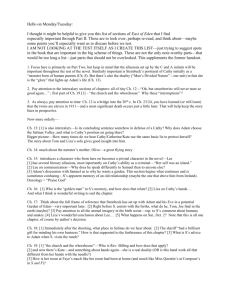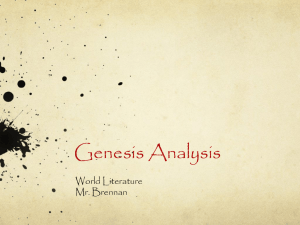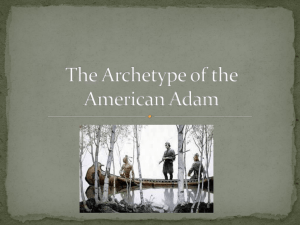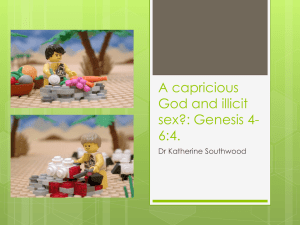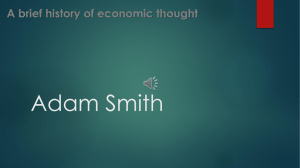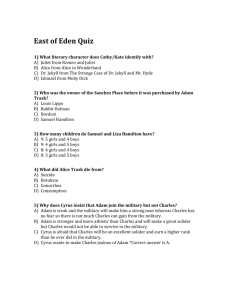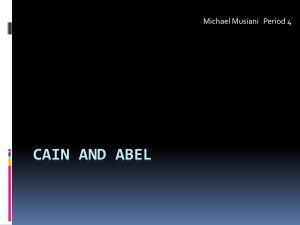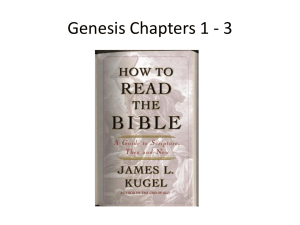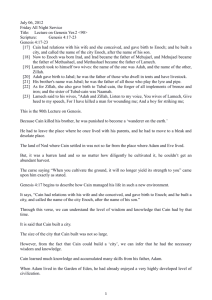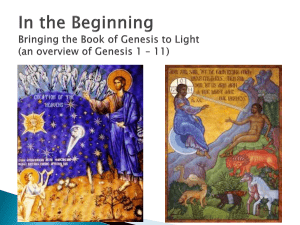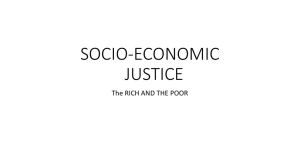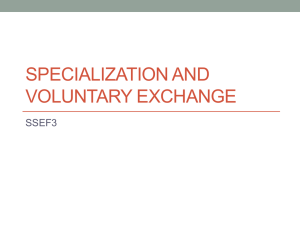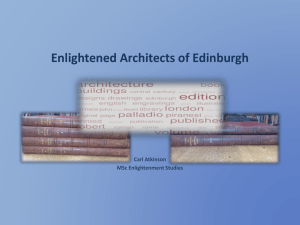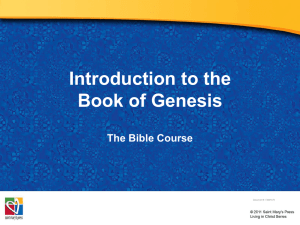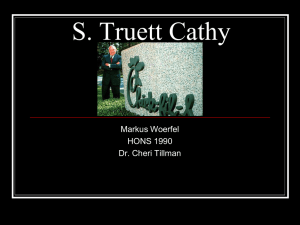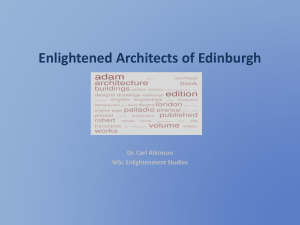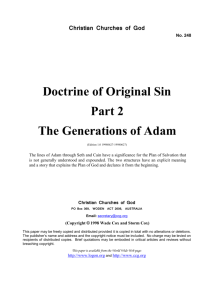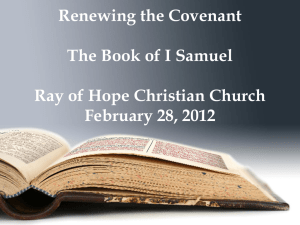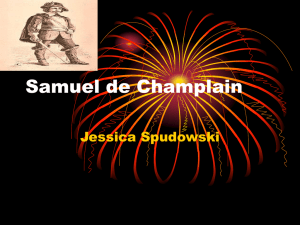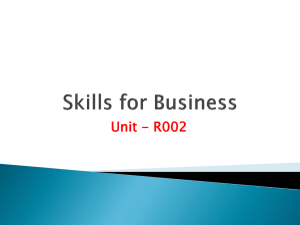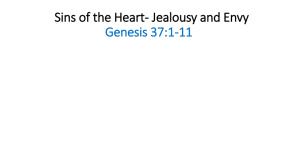East of Eden - Parma City School District
advertisement
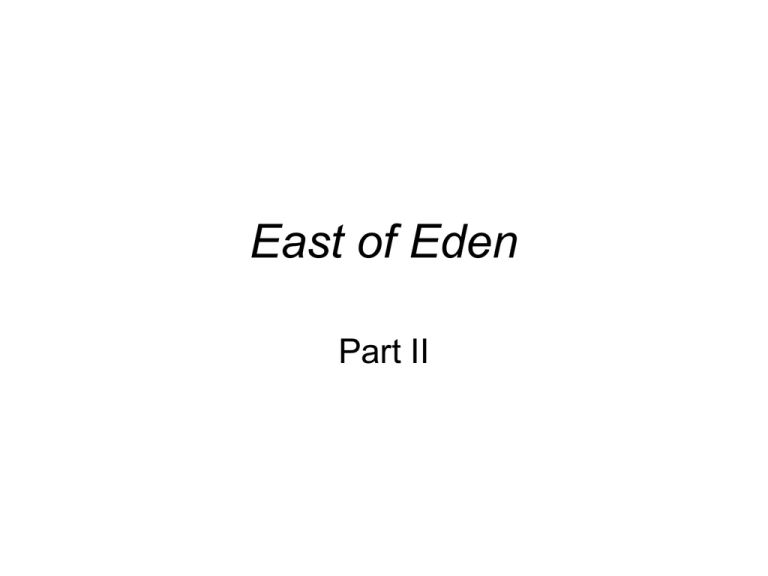
East of Eden Part II Turn of the Century • Nostalgia overlays history – Time of greed and violence – “A man’s mind vagued up as little, for how can you remember the feel of pleasure or pain or choking emotion? You can remember only that you had them” (129). • While nostalgic, unpleasant events forgotten • Renewed sense of hope • Symbolic of characters as well Turn of the Century • Commentary by narrator – “And this I believe: that the free, exploring mind of the individual human is the most valuable thing in the world. And this I would fight for: the freedom of the mind to take any direction it wishes, undirected. And this I might fight against: any idea, religion, or government which limits or destroys the individual. This is what I am and what I am about” (132). • Contrast between collective production and individual creativity • Product of the creative mind is the human’s only “creative instrument.” Angels and Devils • “It would be absurd if we did not understand both angels and devils, since we invented them” (133). – The product of Adam Trask’s creative mind was the idea of Cathy as an angel – Does not see her as an individual but as a fulfillment of his desires Angels and Devils • Archetypes • Adam the hero’s quest – Adam looks for the promise of land • Cathy the devil figure – Cathy tries to abort the baby – “There was something inhuman about her” (135). Samuel Hamilton • Foreshadowing • “’There’s a blackness on this valley. I don’t know what it is, but I can feel it. Sometimes on a white blinding day I can feel it cutting off the sun and squeezing the light out of it like a sponge…There’s a black violence on this valley’” (146). – Precursor of events to follow – Steinbeck involves his historical figures in the fiction • Samuel is poor and happy • Adam is rich and will be unhappy History • Hamiltons • Mood and atmosphere – Brings the narrator's own history forth – Mythical Quality • More of a memoir than fiction • Moves narration to fact and leaves fiction in suspense with Samuel’s prophesy • Contrasts previous chapter with Trasks – Olive loving and caring mother Lee • He lives in preconceived ideas of his heritage – Speaks pigdin – Humorous, intuitive, intellectual – Becomes advisor to Adam and friend to Samuel • Trusts Samuel “you are one of the rare people who can separate your observations from your preconceptions” (163). Adam’s Garden of Eden • Irony – “’Look Samuel, I mean to make a garden of my land. Remember my name is Adam….I won’t plant apples. That would be looking for accidents…You don’t know this Eve. She’ll celebrate my choice. I don’t think anyone can know her goodness’” (169). – Biblical allusion – Adam’s blindness – Cathy enjoys sin – Eve had to be tricked into sinning Samuel and Adam • Contrast in characters – Samuel • Happy, humorous, truthful, clear visionary, deep thinker • Sees Cathy for what she is • ““The eyes of Cathy had no message, no communication of any kind. There was nothing recognizable behind them. They were not human eyes” (177). – Realizes there’s no humanity behind her eyes – Adam • Trapped by fate in marriage • Blind to Cathy’s evil Samuel • Figure of intuition and wisdom – “’The man’s eyes had no depth- they were not like other eyes, not like the eyes of a man…He had the strangest eyes, the golden man. They out me in mind of a goat’s eyes’” (178-179). • Demonic figure in Christianity • Unrepented sinners Cathy • Questions the validity of his claim that Cathy is a monster – “When I said Cathy was a monster it seemed to me that it was so…I wonder if it was true” (184). • No question by end of the chapter – “’Throw them in one of your wells’” – Archetype of the terrible mother and evil being Cathy • Presented as a demon – – – – – Bite Lee’s interpretation Leaves her babies Her strongest connection to another human being Sensory imagery of scene • “He heard the steps on the porch, on the crisp dry oak leaves on the path, and then he could hear her no more. And the monotonous sound that had been there all along was the cry of the twins, wanting their dinner. He had forgotten to feed them” (202). Kate • Develops close relationship with Faye – Self-serving – Kate’s thoughts not revealed • Reader senses something bad will happen • True emotions revealed when she is drunk – “’I didn’t want to drink wine. But you, you nasty fat worm, you made me’” (236). Kate • Archetype devil/ evil figure – – – – – – Murderer Left husband and children Prostitute Sadomasochist Manipulates Faye into thinking it was a dream Irony- other girls comment on her devotion to Faye Adam • Withdraws after Cathy departs – “Adam seemed clothed in viscosity that slowed his movements and held his thoughts down. He saw the world through gray water” (252). – Samuel is the one to bring him back – Name the twin – Reference to Cain and Abel- Cal and Aron • Foreshadows the continuation of the contention Biblical Allusion • “”And the Lord said unto Cain, ‘Why art thou wroth? And why is they countenance fallen? If thou doest well, shalt thou not be accepted? And if thou doest not well, sin lieth at the door. And onto thee shall be his desire, and thou shalt rule over him’” (268). – Translations vary – “thou shalt rule over him”? (God promises Cain he will conquer sin) – “Do thou rule over him”? (God orders Cain to conquer sin – “Thou mayest rule over him”? (God blesses Cain with free will) • Men have free will over moral destinies Cain and Abel • “’My punishment is greater than I can bear. Behold, thou hast driven me out this day from the face of the earth, and from thy face shall I be hid. And I shall be a fugitive and vagabond in the earth…And the Lord set a mark upon Cain, lest any finding him should kill him. And Cain went out from the presence of the Lord and dwelt on the land of Nod on the east of Eden.’” (268). – All men descended from Cain – Inherent in every person is guilt, fear and pain – No man may live in Paradise- must live east of Eden Cain and Abel • Childhood rejection – “I think this is the best-known story in the world because it is everybody’s story…The greatest terror a child can have is that he is not loved, and rejection is the hell he fears. I think everyone in the world to a large or small extent has felt rejection. And with rejection comes anger, and with anger some kind of crime in revenge for the rejection, and with the crime guilt- and there is the story of mankind” (270) • Direct reference to Cain and Abel and Charles and Adam • Adam fails to see relation to past generations and will fail to see connection in the future
